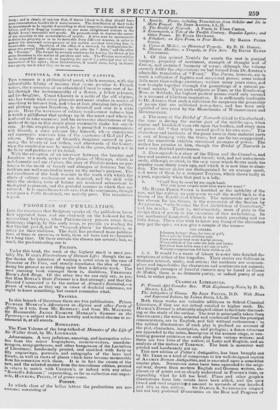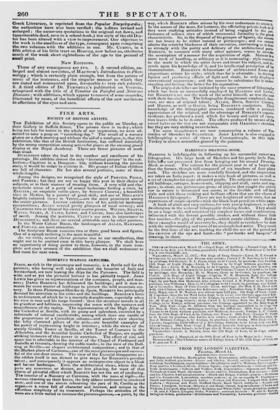CLASSICAL LITERATURE.
P. Terentii Afri Comedite Sex. With Explanatory Notes, by D. B. Deem, LL.D.
The Antiquities qf Greece. By JOIIN POTTER, D.D. 117th Notes and Improved Indices, by JAMES BOYD, LL.D.
Both these works are valuable additions to School Classical Literature, if they are not indeed entitled to higher rank. Dr. Die KEE'S Terence is admirably adapted either to facilitate the read- ing or the study of the author. The text is principally taken from REINHARDT; the notes, selected and condensed from the principal emninentatore, are in English, and full without verboseness : to the critical illustrations of each play is prefixed an account of the plot, characters, inscription, and prologue; a dozen excursus are appended to the notes, descriptive of the ancient stage, or con- taining general criticisms on each play from various writers; and there are two lives of the author, in Latin and English, and an analysis of the metres of TERENCE. The book is moreover well printed and handsomely got up.
This new edition of Potter's Antiquities, has been brought out by Mr. TEGG as a kind of companion to his well-designed reprint of' Anems's Roman Antiquities, and is executed upon a somewhat similar plan. Numerous notes have been appended to the origi- nal text, drawn from modern English and German writers, ex- planatory of points not so clearly understood in POTTER'S time, or expanding what he left too brief. Plans and other graph:o illustrations from late artists have been added, and the cuts (wood and steel engravings) amount to upwards of one hundred awl fifty in this edition. Sir DANIEL K. SANDFORD'S elegant but not very profound Die.sertatiou on the Rise and Progress of Greek Literature, is reprinted from the Popular Encyclopedia; the authorities have also been verified ; the indices revised and enlarged ; the numerous quotations in the original cut down, and (questionable deed, save in a school-book.) the style of the old Doc- tor has been 'altered with a view to improvement. Our objection to the work is the smallness of the type, consequent upon comprising the two volumes with the additions in one. Mr. CHRTIs, in a fifth edition of his little tract on Hearing, now before us, attributes much of the weak short-sightedness of the age to the perusal of
small print.



























 Previous page
Previous page